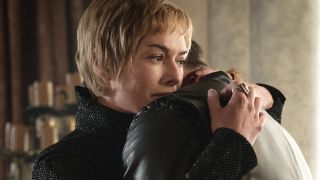Why Game of Thrones’ endgame is just the real world, post-Brexit, with additional dragons
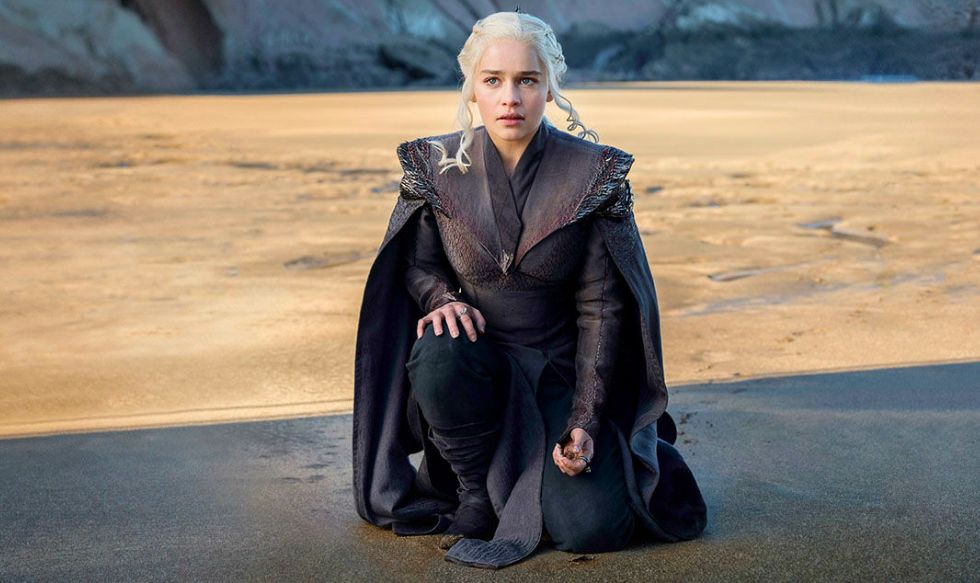
Spoiler warning: This article contains extensive spoilers for all of Game of Thrones to date. If you're not caught up yet, back out until you are.
A few years ago, around the time of season 3, I was talking to a friend about Game of Thrones. We were throwing around theories about the next season or so’s potential events, and somewhere along the line I found myself freewheeling right out to the show’s eventual end-game and conclusion. Obviously I didn’t have all the granular details (and still don’t), but suddenly the overall shape of Thrones’ narrative arc, and the thematic reasons for it, became clear. I knew at the time that I might be going out on a massive limb, but cut forward four seasons, and pretty much everything I predicted is coming true. In truth, I kind of knew it would.
The specifics? Well first there’s the steady erosion of the control enjoyed bythe bloody-minded, selfish, short-sighted, and deeply factional elder generation, leading to a regular offing of its numbers - more often than not resulting directly from their own petty hubris. Tywin? Dead. Walder Frey? Dead. Alliser Thorne, stubborn, vindictive, traditionalist bully of the Night’s Watch? Dead at the order of Jon Snow, the young revolutionary he tried to oppress (and murder). Men of his type are dying a lot.
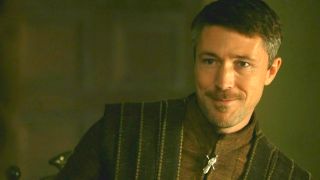
At the same time, we’ve seen the steady strengthening of the increasingly relevant younger generation, not through a new wave of family House factions, but a result of (often suppressed) lone individuals coming together agnostically, for the greater good, in contravention of the old world order and its rules. Jon, once a lowly bastard, is now an accidental king. Arya has become a battle-wise master assassin. Tyrion has found power and respect at the hand of a new (also young) monarch. Samwell Tarly has evolved from bumbling oaf to inspired, potentially critical scientific adviser, simply by standing against the father who kept him down.
Everywhere, we’re looking at the drawn-out death of the old, inefficient, set-in-their-ways, isolationist tribes, and their replacement by a fresh generation without such boundaries and distinctions, whose minds are open to what can be achieved through open collaboration, new ideas, and a focus on something bigger than consolidating power and wealth. It’s all coming true.
The reason I initially saw this coming? Well in broad strokes, Game of Thrones has been playing with some tried-and-true narrative tropes for a long time. Sins of the Father. Inter-generational discord. Breaking the cycle. Escaping the past to become one’s own person. ‘My parents don’t understand me’. ‘The state of youth today’. Parental disappointment. Youthful rebellion. Distrust of the ‘radical’ new ideas of a younger generation. These themes have, individually, been present in popular media pretty much forever, because they’ve been present in real-life for just as long. But Game of Thrones has, from the start, been using so many of them, so frequently, that the shape of its ultimate story destination – and the path taken to reach it – has long been pretty clear.
A story as old as time (almost)
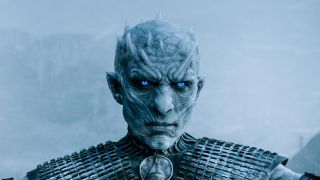
Why are these themes present? Well for starters, a great many of them are very useful – at least in abstraction - in telling the classical ‘Hero’s Journey’ narrative, the archetypal blueprint for pretty much all heroic adventures, from ancient mythology to modern action movies, formalised by narrative scholar Joseph Campbell. The Hero’s Journey – which you’ll immediately recognise if you’ve played any JRPG – starts in a state of assumed societal normality, with a widespread acceptance of the current (often defective or troubled) status quo, and a would-be hero in some way uncomfortable, disconnected, or unable to reconcile with it.
Sign up to the SFX Newsletter
Get sneak previews, exclusive competitions and details of special events each month!
Defined against this historical sense of normal, the protagonist is eventually called to action. They're forced out of (or voluntarily leave) the accepted world, and set about overcoming challenges which ultimately lead to growth, self-realisation and the ability to change their home for the better, by winning the means to overcome its challenges. If you suddenly find yourself applying all of these ideas to the entire younger generation of Westeros, from Jon, to Arya, to Daenerys, to Tyrion, then you’re doing so with good reason. They’re all going through their own versions of it. The status quo in this case is the traditional, deeply hierarchical, divided, adversarial, House-dominated set-up of Westeros in season 1, and the heroes’ various journeys are leading them to the ‘new world’ of personal individuality and the ‘prize’ of collaboration and insurrection.
The other reason these specific themes are such a major part of Thrones (and indeed, Game of Thrones’ universal success), is that they’re endlessly relatable, even on an unconscious level. Everyone has a relationship with, or personal perception of, the generation that came before. Everyone gains a growing sense of self throughout their life, a need to express that, and a desire to reshape their world in sympathy to their own needs. Everyone struggles through adolescence. And everyone, eventually, gets older, and sees a new generation rise up and start to do things differently for themselves.

Beyond the back-stabbings, boobs, revelations and eviscerations, the way that the show consistently plays with this stuff is a huge factor in GoT’s narrative resonance. Hell, these parallels to the universal human journey are almost certainly what defined the universality the Hero’s Journey in the first place. A huge amount of effective storytelling is in the creation of a relatable metaphor for the individual's path through life.
That’s why these themes are, historically, the key to decoding a staggering amount of storylines, portrayed from both sides of the generational divide. A Nightmare on Elm Street, for instance, is about a group of teenagers achieving maturity, self-confidence, and resilience - or dying in failure - while cleaning up a mess wrought by their parents' impulsive, primitive actions, decades previous. The Hunger Games - and the recent boom in dystopian, young-adult fiction in general - drips with themes of oppressed, manipulated, and abused youth overthrowing the complacent cruelty of a Machiavellian, self-obsessed, outdated, older ruling class. And every 'creepy little kid' horror movie you've ever watched is the product of generational anxiety on the part of the older contingent, on some level inexorably scared of being replaced, newly aware of its own mortality having now made itself the elder, and uneasy about what kind of changes its offspring will bring to the wider world.
What happens in Westeros does not stay in Westeros
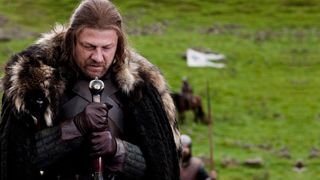
So yes, the general ideas at play in Game of Thrones have been around a long time. But what's interesting in this case is just how many of them are explored so intensely, so explicitly, and from so many different angles. Find me some non-abusive parents in Westeros, and I'll point toward a couple of dead Starks and pretty much no-one else. George RR Martin's world might be a cold, uncaring crapsack continent at the best of times, but in terms of its citizens' approach to child-rearing, it's positively a cruelty theme park, where every kind of abuse and repercussion is explored in harrowing detail. Favouritism, disinterest, bullying, abandonment, manipulation, even outright, profiteering exploitation and murder. The older generation of Westeros has collectively - and consistently - wrought all of these things upon its children in the name of maintaining its own claim on power, and in the case of Tywin Lannister, pretty inflicted the whole lot on a daily basis.
The generational cross-over we currently find ourselves observing in the real world often seems potent with the same tensions as Thrones.
Why is this such a conspicuous theme in Game of Thrones? Well of course I can't speak directly to Martin's intent, or that of the show's producers, but things start to get very interesting when we look at popular art as a barometer for the social climate of its time. Because popular art is always that, from Godzilla's physical expression of Japan's ongoing horror at Hiroshima, to Aliens' biomechanical exploration of America's failure in the Vietnam war. And the reason, I think, that Game of Thrones' key source of dramatic tension is this particular flavour of generational angst - rife, as is, with the clash between materialistic, power-hungry parents and children who simply want to live a progressive, free life - is that the particular generational crossover we currently find ourselves observing in the real world often seems potent with the same.
Every period of torch-handing has a version of this angst, of course. There's always a period where one side's trust in the other's behaviour starts to fail. Remember when video games were called out as the source of a new generation's moral downfall? Or when Rock 'n' Roll was the poison of virtue, and Elvis an insidious, gyrating sex-devil? Or when short-haired, 1920s flappers turned perceptions of personal presentation and decorum on their heads? Well obviously you probably don't literally remember all of those, but you see my point. The difference this time though, is that for a long period there's been very pronounced and very specific criticism on both sides.
Generation vexed
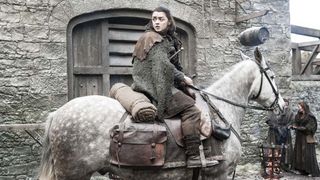
This time, it isn't simply a case of the older generation being freaked out by young people doing a weird new thing that's really no more troublesome than the weird new things they themselves did at the same age. There is that, of course, but there's also the fact that, these days, 'Baby Boomer' isn't far off an expletive. It's a generalisation, as these things always are, but there's a very real perception that today's older generation has, consciously or not, royally screwed over its offspring.
Between the inflated prices of the limited housing market, the lending crisis, the banking collapse, the relative lack of repercussions for those responsible, and the perceived lack of accountability of governments populated by an affluent, cronying, old-boys' network that prioritises immediate personal comfort and self-interest over investing in the long-term future, in some circles it is Really Not Cool to be over 60 in the west right now.
All of this has led to the unfortunate – and let’s be honest, not always accurate – assumption than any grey-haired person whom one does not already know to be lovely is probably an exclusionary, regressive, self-centred jerk. In contrast, certain quarters of the mainstream, Boomer-focused media have spent the last few years criticising millennials as whiney and over-sensitive, usually via the medium of whining about how millennials are ruining literally everything in the world. With so many different criticisms levelled, it’s often hard to pick out the ultimate source of the discontent, but the general gist seems to be the idea that not liking war and preferring avocado on your toast to a hound-shredded fox cub makes you a wimp.
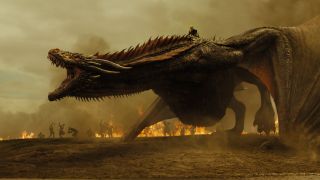
Oh, and there's Brexit as well. Because of course there's Brexit. A recent occurrence, granted, but one that to some felt like a crystallisation of the way things had been unfurling for a long time. A vertical slice of many years' frustration and growing resentment. The notably younger-skewing Remain vote wanted unity, freedom, and progressive relationships across the European continent, while the older vote favoured isolationism, a sense of tradition, and an idealised feeling of victory through boundaried autonomy, using arguments of financial gain and political strength in order to fight for those things. The result? A long-term change that largely contradicts the wishes and interests of the generation who will live through most of it, while those who voted for it might live comfortably (assuming they can afford to), but for a comparatively limited period.
And with that, we're right back in Westeros.
Because let's look at what's going on over there. Where Brexit felt like the ultimate distillation and fallout from years of generational distrust, and a perceived dichotomy of long-view vs. short-view, the final struggle for control of the Iron Throne is shaping up to be exactly the same thing. And interestingly, it increasingly seems that one's level of interest in winning the Throne (or at least a person's investment in the old-world systems that support its dominance) is inversely proportional to the amount of time they have left to live. Because let's think about who survives and prospers in Game of Thrones, shall we? And then let’s contrast their outlooks and values against those who end up dying horribly.
Spare the rod, spoil the child. But the child might not kill you

Jon Snow could barely be a purer antithesis to the old ways of elder, divided Westeros. Devoid of legitimate parentage, his bloodline is so muddled that he isn't even the bastard he thinks he is. Variously cast astray from two different, major Houses, he has since excelled on his own terms, rising to power at both the Wall and in Winterfell, precisely because he wants nothing of the sort. The most reluctant ruler in Westeros has enjoyed the most loyal followings, becoming a good and trusted leader as a direct result of his general distaste for power or factionality. As such he's a walking metaphor for Game of Thrones' values.
Arya is as anti-establishment as it gets, even before you get into that whole 'loves assassinating kings and nobles' thing.
Daenerys was literally sold out by her big-name family in a bid for resurgent power, and since then own her rise has been (mostly) typified by an opposite-world version of the way things are done by the western continent’s controlling Houses. She grasped her first real authority by forging a close, emotional connection, then earned the love and loyalty of her people, and then used her strength not to conquer, but to shatter the systems of those who had conquered.
Arya, the girl who travelled so far from her home and her name as to actually aspire to become nobody - before discovering even the doctrine of nobodies to be too oppressive and regimented for her - is as anti-establishment as it gets, even before you get into that whole 'loves assassinating kings and nobles' thing. And it's important to note that her motives for killing are consistently pure, always with the aim of simply removing a rotten individual, rather than for personal or political gain.
Bran has been wandering around the woods for years, avoiding the in-fighting and contrived concerns of the establishment, and gaining a greater understanding of the wider universe at large. As a result he's basically now Professor X, and gives off the air of someone who could explode your head just by thinking about it. All this, from the pursuit of knowledge and insight rather than power. Gendry? He's stayed way the fuck out of everything, and he's been doing just fine as a result.
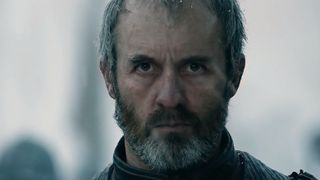
On the other, mostly older, and now largely dead, side? Tywin was murdered on the toilet by the son he oppressed, after a lifetime spent personifying the petty, political, inward-looking profiteering of elder Westeros. Stannis, with a pretty legitimate claim on the Throne, and a general air of smarts and decency about the way he conducted himself, was doing okay until lust for victory overtook his better judgement and caused him to murder his daughter in investment for a win. He was dead pretty quickly after.
Walder Frey? Instigator of politically motivated murder, aimed out of spiteful pride at a young king, his young wife, and their unborn child (so hitting two younger generations at the same time). End result? Murdered after being made to eat his own children, an act that, metaphorically at least, he - like many Westerosi nobles – had been conducting for some years already.
Young heads with old hearts, and the occasional case of older *and* wiser

Stepping slightly outside of the generational roles for a moment, it's worth noting that the same principles still apply. Sam Tarly's brother, Dickon, seemed a decent sort, possibly destined for great things, right up until the moment he resisted change, redoubled his allegiance to the old order, and died hand-in-hand with his bullying, old-guard asshole of a father, scorched to dust in a second. Conversely, disowned brother Sam, valuing love, freedom, and intellect over status and warmonging, is turning into one of the story’s most influential characters.
And in contrast to Dickon, there's Ser Davos. Humble, decent, devoid of ego or ambition, and seemingly loyal to quality rather than assumed authority, he has, despite his own frequent self-admonishments, done far better than any self-aggrandising, power-wielding, pride-slinging member of his generation. He's also, right now, potentially still in the running to be the fabled 'Prince that was promised', which would be ironic given his lack of regal ambition, but also utterly fitting and right, given the way Game of Thrones works. In fact, all things considered, I’d be inclined to bet on it happening. I bloody love Ser Davos. Ser Davos is great.
Either way, the ultimate statement seems to be ‘Get over yourself, and get over your old squabbles. Status and money don’t mean anything in the long-term, and the more you focus on them, they more you hurt (or fail to help) everyone’. All of which brings us on to Cersei. Which is where things ultimately, I think, come to a head.
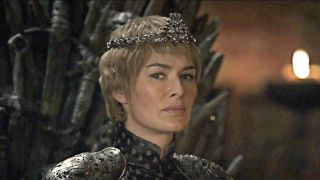
In Cersei, we have a failing leader who’s overconfident to the point of pitiful delusion, standing unaware on terribly shaky ground, with dwindling support and attackers on all sides, and whose only option now is to pay for the back-up she needs – all of this in a story that was probably written several months before British Prime Minister Theresa May donated £1 billion to the Democratic Unionist Party of Northern Ireland in exchange for the voting support required to not quite lose the last general election, following the fallout from Brexit and a newly invigorated, left-wing youth vote. It’s quite the, er, coincidence.
Cersei’s single-minded, self-interested, increasingly aggressive approach to rule has led to dire circumstances – as it always does in Game of Thrones – resulting in the deaths of all of her children, just to hammer the point home once again. The White Walkers are nearly at the door (not that she’s paid them the slightest bit of attention in her quest for power and vengeance), and if it weren’t for the newly-announced pregnancy - which she’s unlikely to carry to full term - Jaime would be close to leaving through the very same portal. Things are grim indeed for Cersei Lannister and, like every Westerosi leader too obsessed with elevating their own little corner to see what’s going on in The Actual World, she’s not going to see the end coming. No more so than her father did. A father who the show is now explicitly stating – via the mouth of Iron Bank representative Tycho Nestoris – she has become the sequel to.
In fact there’s now every chance that Cersei’s downfall will come as a direct result of trying to emulate Tywin’s methods. Yes, she’s cleared the Lannister debt to the Iron Bank, but that might be precisely what finishes her off, given that her shrunken family’s newfound lack of profitability surely makes them far less important to the organisation. In fact, I wouldn’t bet against it. There would be no more fitting downfall, given Game of Thrones’ eternal subtext of progress vs. traditionalism, if Cersei’s end came as a direct result of observing the historical family motto: “A Lannister always pays their debts.”
Keep your eyes *off* the prize
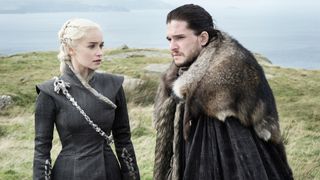
Where does this leave everyone else, should the Iron Throne indeed be vacated? Well if they have any sense, it leaves them far from the Throne indeed. Because at this point, I believe that chair is nothing more than a generations-old red herring. No-one who has sat on it has had a good end. No-one who has pursued it has done well out of the bid. All have been corrupted, all have hurt those around them, and all, via the Throne-inflicted, inward-looking obsession with petty, short-lived power, have invested in the future ruin of Westeros by ignoring a larger threat. That Throne is poison, make no mistake about it. The only way you win the Game of Thrones is by not playing it. If the show has a long-term message, that seems to be it.
So there’s now a really interesting parallel between Cersei and Dany, which, again, the show has finally been making explicit over recent episodes. Where Cersei seeks to emulate her father’s conniving, brutal sense of self-preservation down to a T, Dany has long rejected her own father’s ways, claiming to be the figurehead of a new way of life. The tricky bit though, is that of late she’s been having trouble making a convincing case for that. Barely concealed, single-minded Throne-lust. The nuking of an entire army just to make a point. The ‘recruitment’ of the survivors, at the business-end of a dragon’s snout (hellooooo, the very same slavery that she once disavowed as archaic and cruel).
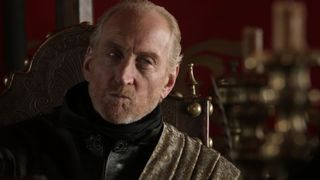
The closer that Dany has come to the Throne – literally and figuratively – the more blindly driven and morally ambiguous she has become. Given how easily she eventually chose the dragon option against the Lannisters, it’s easy to imagine that without the friends and advisers she has, she’d now be a lot further down the Throne corruption rabbit hole. Poison. It’s naught but poison with a really uncomfortable-looking seat.
So it seems, ultimately, that the final fate of the main players will be defined not by how effectively they can claim the Iron Throne, but by how willing they are to step away from it, and the old world it represents. Because winter has come. Petty, local power-struggles about whose small-view outlook is best are going to mean naught when the frost zombies come a-calling. In Westeros, as in the real world, it might feel good to see yourself as top-dog in a little, isolated province, but if that blinds you from the dangers of a potential world-wide, climate-change apocalypse… Well, no-one’s going to give a fuck about you or what you had once you’re dead.
Most Popular




